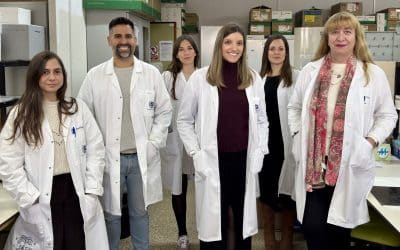- Thanks to an epigenetic study, it has been possible to identify new mechanisms that affect the development of this type of liver pathology, which is closely linked to overweight and obesity.
- Researchers from IBIMA Plataforma BIONAND and the University of Malaga, in collaboration with the Instituto Murciano de Investigación Biosanitaria (IMIB), have participated in this work.
A study carried out by researchers at the Biomedical Research Institute of Malaga and Platform in Nanomedicine (IBIMA Plataforma BIONAND), who work at the University of Malaga, has revealed how alterations in the epigenetic state of the liver are related to the aetiology of steatotic liver disease associated with metabolic dysfunction (MASLD), and its progression to its most severe form, steatohepatitis (MASH). This type of liver disease is mainly caused by the accumulation of fat in the liver as a consequence of unhealthy lifestyle habits. Therefore, in many of these patients, the onset of MASHLD is directly related to being overweight or obese.
The study, published in the scientific journal ‘Biomedicine & Pharmacotherapy’used advanced sequencing technologies to examine the state of chromatin - the way genetic information expressed in DNA is located in the nucleus of a cell - in the livers of patients with varying degrees of MASLD, correlating with gene expression.
The methodology employed by this team of researchers has included new generation techniques in order to study epigenetics, a discipline that studies the heritable and reversible changes that occur in gene function without modifying the DNA sequence.
The study focused on comparing the chromatin status of liver biopsies from subjects with and without MASH, using chromatin accessibility sequencing (ATAC-seq) and RNA sequencing (RNA-seq). The results showed that MASH patients had down-regulation of lipid and glucose metabolic pathways, as well as significant changes in chromatin accessibility in genes related to lipid metabolism and glucose homeostasis.
The researcher who led this study, who belongs to the multidisciplinary paediatric research group of the Institute and the Faculty of Medicine of the University of Malaga, Fernando Cardona, said that ‘this study provides a deeper understanding of how changes in chromatin structure may influence the origin and development of MASH’. In this sense, Dr. Cardona added that for the future ‘new avenues are opening up for the identification of biomarkers and possible therapeutic interventions aimed at the underlying epigenetic mechanisms, which would have a direct impact on the early diagnosis and treatment of the disease’. This research group belongs to the PAIDI CTS-981 group of the Department of University, Research and Innovation of the Andalusian Regional Government and to the A-19-Multidisciplinary Paediatric Research Group and CIMO-01-Clinical and Translational Research in Cancer groups of the IBIMA BIONAND Platform.
For his part, the researcher from the same IBIMA Plataforma BIONAND group, Dr. Daniel Castellano, added that ‘these findings underline the importance of considering epigenetic studies in the development of treatments for MASH. The identification of differentially accessible chromatin regions and their effects on RNA transcription gives us a new perspective on the molecular mechanisms that contribute to this disease’.
The study included liver samples from patients with obesity recruited for bariatric surgery at the Hospital Universitario Virgen de la Arrixaca between 2020 and 2021. The liver samples were analysed to determine differences in chromatin accessibility and gene expression between patients with and without MASH.
In addition to IBIMA Plataforma BIONAND, the Instituto Murciano de Investigación Biosanitaria (IMIB) and the Hospital Universitario Virgen de la Arrixaca de Murcia have participated in this study.
Raúl J. Andrade Bellido, es Investigador Responsable del grupo consolidado ‘Hepatogastroenterología, Farmacología y Terapéutica Clínica Traslacional’ de IBIMA Plataforma BIONAND, Catedrático y Director del Departamento de Medicina en la Facultad de Medicina de la Universidad de Málaga, Jefe de Servicio Aparato Digestivo del Hospital Universitario Virgen de la Victoria en Málaga. Además, es el Responsable del Grupo Español de Hepatopatias asociadas a medicamentos (Spanish DILI Registry), el Coordinador de la Red Ibero-Americana de Hepatopatías asociadas a medicamentos (SLATINDILI) y también del Registro europeo de Hepatopatías asociadas a Medicamentos (Pro-Euro DILI Registry). Chair de la COST Action CA17112 – Prospective European Drug-Induced Liver Injury Network (PRO-EURO DILI NET) y del EASL DHILI Consortium. Horizonte2020. Framework Programme (European Union).



